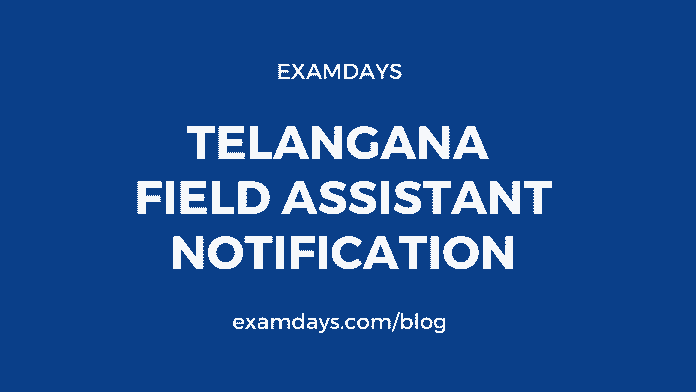Telangana Field Assistant Notification 2021: Telangana State Public Service Commission (TSPSC) released a notification to fill the Telangana TSPSC Field Assistant Notification 50 vacancy posts, the online application can available, those who are interested to apply for TSPSC Jobs in Telangana State can check Candidate eligibility, Age, Qualification, Location of Post, Job Responsibilities, TSPSC Salary, Field Assitant Salary.
The field assistant exam will be conducted from December, as per the new schedule from the TSPSC Authorities, No election code will be held on this TSPSC Examination due TSPSC Is a commission no election code will stop. The complete field assistant exam date details information were given – Click Here for Official PDF Notification
The Number of Vacancies is announced in the month by Telangana TSPSC Authorities and the recruitment to be finished in under 3 months as a pilot project level. All Health assistants have different syllabus of other posts syllabus posts Telangana TSPSC Health Assistant..
Telangana Field Assistant Notification
- The Total number of vacancy Posts is announced: 08 Vacancy Posts.
- Name of the Posts: Bill Collector.
- Age Assigned for Candidate: 18 – 44 Age and age relaxation can apply for reserved candidates. Minimum 18 years & Maximum 44* years. The age is reckoned.
- Telangana TSPSC Scale pay/ Salary/ Pay is Rs.16,400/- to Rs.49,870/
| Name of the Post | Vacancies | Age as on | Salary |
| Field Assistant | 08 | 18-44* | 16,400-
49,870/- |
Educational Qualification
Intermediate with Biological Science of State Board of Intermediate Examination.
Application Fee
Each applicant must pay Rs. 200/- (RUPEES TWO HUNDRED ONLY) towards Online Application Processing Fee. This apart, the applicants have to pay RS. 80/- (EIGHTY RUPEES ONLY) towards Examination Fee. However, the following category of candidates is exempted from payment of Examination fee.
TSPSC Exam Centers
The Written Examination (Objective Type) will be held at the following centers or as may be decided by the Commission. Those who applied for TSPSC Sanitary Inspector can choose the below-listed examination centers as per choice in ascending order.
- HYDERABAD
- KARIMNAGAR
- KHAMMAM
- WARANGAL
- NIZAMABAD
- MAHABOOBNAGAR
- RANGA REDDY
- MEDAK
- NALGONDA
- ADILABAD
Important Dates
- Submission of ONLINE applications from Date: NA
- Last date for submission of ONLINE applications Date: NA
- The Examination is likely to be held on Date: Not Yet Confirmed
Telangana TSPSC Field Assistant Syllabus
The candidate checks the Telangana TSPSC Health Assistant Syllabus, which is published by the TSPSC officials, the syllabus is available in English and Telugu languages.
| Subject | No.of
Questions | Duration (Minutes) | Maximum Marks |
| General Knowledge and Biological Sciences (Intermediate Level) | 150 (General Knowledge 75 + Biological Sciences 75 (Intermediate Level)) | 150 | 150 |
Paper: General Knowledge and Biological Sciences (Intermediate Level)
- General Knowledge:
- Current affairs.
- International Relations and Events.
- General Science in everyday life.
- Environmental Issues and Disaster Management.
- Geography and Economy of India and Telangana.
- Indian Constitution: Salient Features.
- Indian Political System and Government.
- Modern Indian History with a focus on Indian National Movement.
- History of Telangana and Telangana Movement.
- Society, Culture, Heritage, Arts and Literature of Telangana.
- Policies of Telangana State.
- Biological Sciences (Intermediate Level) Botany
Diversity of Plant World
Branches of Botany-Plant Kingdom- Salient features, classification and alternation of generations of the plants of the following groups-Algae, Fungi, Bryophytes, Pteridophytes, Gymnosperms and Angiosperms.
Morphology – Morphology of flowering plants: Vegetative: Parts of a typical Angiospermic plant; Vegetative morphology and modifications-Root, stem and Leaf – types; Venation, Phyllotaxy.Reproductive: Inflorescence-Racemose, Cymose and Special types (in brief)-Flower: Parts of a flower and their detailed description; Aestivation, Placentation-Fruits: Types – True, False and parthenocarpic fruits.
Plant Systematics – Taxonomy of angiosperms:Introduction, Types of Systems of classification (In brief), Description of Families: Fabaceae, Solanaceae and Liliaceae. Cell Structure And Function – The Unit of Life- Cell-Cell theory and cell as the basic unit of life- overview of the cell., Prokaryotic cells, Ultra structure of Plant cell (structure in detail and functions in brief), Cell membrane, Cell wall, Cell organelles; Endoplasmic reticulum, Mitochondria, Plastids, Ribosomes, Golgi bodies, Vacuoles, Lysosomes, Microbodies and Nucleus, Chromosomes: Number, structural organization; Nucleosome,Cell cycle and Cell Division- Cell cycle, Mitosis, Meiosis- significance. Plant Physiology – Transport in Plants: Diffusion, Active Transport, Plant-Water Relations, Translocation of Mineral Ions. Mineral Nutrition: Role of Macro & Micro Nutrients, Deficiency symptoms of essential elements. Enzymes: Chemical Reactions, nature of enzyme action, Classification and Nomenclature of Enzymes. Photosynthesis: Cyclic and Non-cyclic Photo-phosphorylation, Calvin cycle. Respiration of Plants: Glycolysis, Tricarboxylic Acid Cycle, Electron Transport. Plant Growth and Development: Auxins, Gibberellins, Cytokinins, Ethylene and Abscisic Acid.
Microbiology – Bacteria: Morphology of Bacteria, Bacterial cell structure- Nutrition, Reproduction – Sexual Reproduction, Conjugation, Transformation, Transduction. The importance of Bacteria to Humans.
Viruses: Discovery, Classification of viruses, Structure of Viruses, Multiplication of Bacteriophages- The Lysogenic cycle, Viriods, Prions, Viral diseases in Plants, Viral diseases in Humans.
Ecology & Environment: Ecosystem: Biotic and Abiotic factors, types and components of ecosystem, food chains, food Web, Energy flow and Ecological pyramids. Carbon, Nitrogen & Phosphorous cycles. Population attributes: Growth, Natality and Mortality, Age distribution, Population regulation.Flora and Fauna of Telangana.
Zoology
Zoology – Diversity of Living World
- Branches of Zoology; Basic principles of Classification: Biological system of classification
- Species concept
- Biodiversity – Meaning and distribution (Genetic and Species Diversity, Ecosystem diversity), other attributes of biodiversity, role of biodiversity, threats to biodiversity, methods of conservation, IUCN Red data books, Conservation of wild life in India.
Structural Organization In Animals
- Levels of organisation, Multicellularity: Diploblastic & Triploblastic: types of Summetry
- Tissues: Ephithelial, Connective, Muscular and Nervous tissues.
Animal Diversity
General characteristics and classification up to classes – Porifera, Cnidaria, Ctenophora, Platyhelminthes, Nematoda, Annelida , Arthropoda, Mollusca, Echinodermata, Hemichordata and Chordata – Protochordates, Pisces, Amphibia, Reptiles, Aves and Mammalia.
Biology & Human Welfare
- Parasitism and parasitic adaptation
- Health and disease: Life cycle, Pathogenecity, Treatment & Prevention: Entamoeba, Plasmodium, Ascaris, Wuchereria
- Drugs and Alcohol abuse.
Human Anatomy and Physiology
- Digestion and absorption : Nutrional disorders: Protein Energy Malnutrition (PEM), Kwashiorkor.
- Breathing and Respiration: Respiratory disorders: Asthma, Emphysema, Occupational respiratory disorders.
- Body Fluids and Circulation: Disorders of circulatory system: Hypertension, coronary artery disease, angina pectoris, heart failure.
- Excretory products, their elimination and Disorders.
- Muscular and Skeletal system: Generation and conduction of nerve impulse; Reflex action; Sensory perception; Sensory receptors.
- Endocrine system: Hypo and Hyper activity and related disorders: Dwarfism, acromegaly, cretinism, gioter, diabetes.
- Immune system: Basic concepts of Immunology – Innate Immunity, Acquired Immunity, Active and passive Immunity, cell medicated Immunity and Humoral Immunity, HIV and AIDS.
- Reproductive Health: Reproductive health and STD; Birth control, contraception and medical termination of pregnancy; Amniocenteses; IVF-EF, ZIFT, GIFT.
Genetics and Evolution
- Principles of Mendelian inheritance, Multiple alleles, Sex Determination, Sex linked inheritance, Metabolic and Chromosomal disorders.
- Origin of Life, Evidences for biological evolution, Theories of evolution: Lamarckism, Darwin’s theory of Evolution – Natural Selection with example; Modern synthetic theory of Evolution; Gene flow and genetic drift; Adaptive radiation; Speciation – Allopatric, sympatric; reproductive isolation.
Applied Biology
Bio-medical Technology: Diagnostic Imaging (X-ray, CTscan, MRI), ECG, EEG, Application of Biotechnology in health: Human insulin and vaccine production; Gene Therapy; ELISA; Vaccines, MABs, Cancer biology, stem cells. Single cell protein (SCP), Tissue culture – Microbes in Human Welfare-Microbes in Household products, Microbes in Industrial products- Fermented Beverages, Antibiotics, Chemicals, Enzymes and other Bioactive Molecules, Microbes in production of Biogas, Microbes as Biocontrol Agents, Biological control of pests and diseases, Microbes as Bio fertilisers.
ANALYSIS OF Field Assistant Notification
- Number of posts: 08 Posts
- Applications Received: Pending to Update
- Competition of Each Post: Pending to Update
- Languages Opt: English, Telugu, and Urdu.
- Number of Questions: 150 Questions
- Number of Marks: 150 Marks
- Exam Duration: 150 minutes
- Mode examination: Offline / Online
- Type of Exam: Objective and Descriptive
- Negative Mark: No


